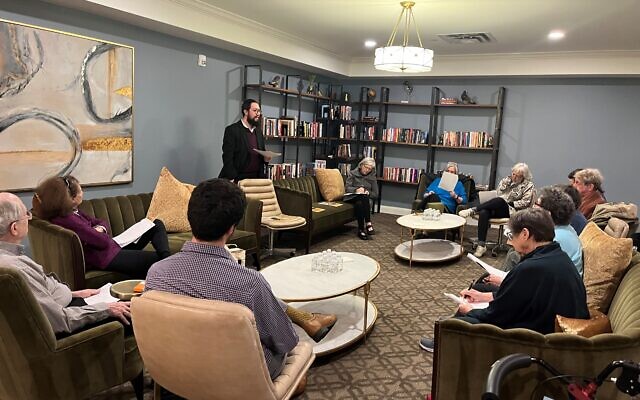Slavaticki Makes Yiddish Fun
Decatur Chabad Rabbi Avremi Slavaticki delighted seniors with his Yiddish language and culture series at Holbrook on Clairmont Road. Members of the Jewish community at-large also joined the class.
After 37 years with the Atlanta Journal-Constitution and now with the AJT, , Jaffe’s focus is lifestyle, art, dining, fashion, and community events with emphasis on Jewish movers and shakers.

Senior facility The Holbrook Decatur sponsored an entertaining series of Yiddish language and culture classes with Rabbi Avremi Slavaticki, Chabad Decatur, who just happens to be from Belgium and a native Yiddish speaker.
He said, “I didn’t learn English until I was 16, and it’s my fourth language! I grew up thinking that Yiddish was the ‘normal’ language.’ As if it’s not confusing enough to learn a new language, and not just the basics, ‘Oy,’ and ‘Nu?’”
Slavaticki is teaching both the Russian and Polish dialects, the former being from the former Soviet Union, and the latter hailing from Galitziana and Hungary.
Slavaticki grew up in a Yiddish school and still speaks to his siblings in Yiddish. He is also fluent in Flemish, but Hebrew was spoken at home.

He explains, “My Israeli father didn’t speak Yiddish, so we had some Hebrew infiltration, while my grandmother spoke Russian Yiddish. Hebrew is more practical while Yiddish is dying.”
The series is made doubly interesting by learning about the rabbi’s native Belgium. Located in the Flemish region, Antwerp is the fourth largest city in Belgium with a population of around a half million with 18,000 Jews.
Antwerp is best known for its role in the diamond industry which leads to about half the population being of immigrant origins. Its history dates to the Middle Ages, and it’s known for being a thriving seaport with fine arts. Dutch, German, and French are all spoken there.
Slavaticki took the class on a cultural tour and stated, “Remember, Yiddish was only a spoken language for its first 200 years. Then, they discovered a makser (prayer book) in Germany with the Yiddish language’s earliest writings around 1272. And prior to the Holocaust, there may have been 12 million Yiddish speakers, which then tragically diminished by six million. Before that, in World War I, there was an entire culture with songs and literature. Yiddish has very long words, when they added the vowels from the alphabet … like my own name has six additional letters.”
Slavaticki kept the class involved with language drills by category, like expressions that are curses – not just any curse, only health curses. Other categories included conjugating verbs, naming body parts, how to speak to your doctor, useful greetings, and “question” words. Fun was made of why Jews were so engulfed in elaborate curses.

Slavaticki’s choices were: “I hope you get sick and remember it”; “No doctor should help you”; “May you crawl on all fours”; “You should become yellow and green”; “Curse you rooted in Cholera”; “May you beat your head on the wall”; And wait, “He should break his left hand, his right foot.”
“Zol er tsubrekhn a linke hant un a rek fus!” one student yelled out, “Is that worse than breaking the right hand, and left foot? What were they thinking? What suffering!”
One of the most advanced students, Reeva Katter Hersch, recalled that she grew up in Chicago in a family who spoke Yiddish. “My mother was one of 10 siblings. We sometimes mixed Yiddish in with our English unknowingly, like ‘I need to biggel (iron) my skirt.’”
Many of the common words used affectionately, like gevalt are difficult to define literally. Rabbi Slavaticki took a stab at it, “Gevalt means, ‘No way’, it’s scary, maybe a flood is coming!’”

Then, there are the melodies. The modest rabbi has a stirring and evocative singing voice. His best tune was, “Mein Shtele Belz,” about Jews new to the U.S., yearning for their Jewish life back home in Bessarabia, written in 1928 for the play, “Ghetto Song,” as tribute to singer Isa Kremer. “That’s it!” exclaimed Slavaticki,” From Belz to Holbrook!”
Alex Hoff, community relations manager said, “Holbrook Decatur is proud to have a vibrant Jewish population. On the whole, we are always looking for ways to intellectually enrich the lives of our residents and believe it’s essential to offer them inspiring opportunities to embrace lifelong learning and growth.”



comments